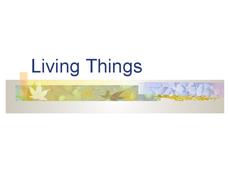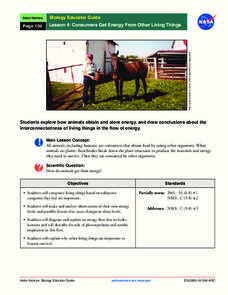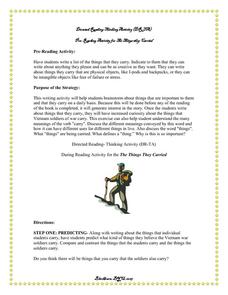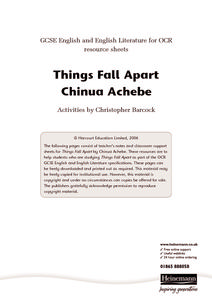Curated OER
Do You Prefer Your Children's Book Characters Obedient or Contrary? Opinion Writing
With this New York Times "Learning Network" exercise, high schoolers read an article about the death of Maurice Sendak, author of Where the Wild Things Are and then respond to several prompts that require them to shape their own opinions...
Facing History and Ourselves
Three Good Things
A "Three Good Things" routine asks participants to sit quietly and reflect on three positive things in their world: family, school, community, or the world at large. After journaling about one that feels most important right now, writers...
Curated OER
Living Things
Alive or not? After viewing this presentation, life science learners will know how to answer this question. They are introduced to the seven processes of living systems and the classification hierarchy. Because it only covers...
Curated OER
Basic Needs of Living Things - Lesson One
An interesting way of teaching about basic needs of different organisms awaits your fourth graders. Pupils take part in class discussions and demonstrations which should lead to a greater understanding of how to determine basic needs. As...
Curated OER
The Things They Carried by Tim O'Brien
For this online interactive reading comprehension worksheet, students respond to 13 multiple choice questions based on The Things They Carried. Students may submit their answers to be scored.
Curated OER
The Things They Carried by Tim O'Brien
In this online interactive reading comprehension worksheet, learners respond to 6 short answer and essay questions based on The Things They Carried. Students may also access an online quiz on the selection using the link at the bottom of...
NASA
Consumers Get Energy From Other Living Things
How do plants and animals get their food? Learn about where energy comes from, how animals store energy, and aerobic respiration, in a instructional activity that allows scholars to diagram energy flows.
Curated OER
The Things they Carried: Directed Reading Thinking Activity
To generate interest in and enable readers to connect to The Things They Carried, class members write about what they carry—both tangible and intangible things. The class then makes a list of these things and compares the list to...
Curated OER
Student Opinion: What Small Things Have You Seen and Taken Note of Today?
An interesting and unusual topic for a news article, this resource from the New York Times website asks learners to take a moment and consider all the things they notice during a typical day. Based of the editorial piece "Things I Saw"...
Curated OER
Things Fall Apart Chinua Achebe
Here’s a 19-page Things Fall Apart teacher resource packet from the UK that includes background information on Chinua Achebe, the culture of the Ibo people before and after colonization, and activities designed to prepare learners for...
Baylor College
Living Things and Their Needs: The Math Link
Enrich your study of living things with these cross-curricular math activities. Following along with the story Tillena Lou's Day in the Sun, learners will practice addition and subtraction, learn how to measure volume and length, work on...
Harper Collins
Every Thing On It Lessons and Activities
Honor the great poet, Shel Silverstein with eighteen activities and lessons showcasing his collection of poems from the book, Every Thing On It. Activities challenge scholars to rhyme words, make inferences, recite a poem, and more!
Central Oregon Community College
Things Fall Apart Study Guide
“There is no story that is not true.” And Chinua Achebe’s Things Fall Apart, uses proverbs (“. . .the palm-oil with which words are eaten”), a compelling tragic hero, and historic events, to engage readers in the truth of his story of...
ESL Kid Stuff
Describing Things (Adjectives)
Describing things using adjectives is the focus of this instructional activity designed for language learners. Class members play games, draw pictures, and sing songs, adding adjectives to describe animals.
It's About Time
Diversity in Living Things
How diverse is the world we live in compared to the way things used to be? Young biologists explore diverse organisms and relate the structure of each organism to its ability to survive in our current environmental conditions....
Institute of Electrical and Electronics Engineers
Smart Buildings and the Internet of Things
Is your building a smart building? Pupils learn what makes a building smart and about the internet of things. After viewing several videos on the topic, they conduct an activity collecting data from sensors and brainstorm ways to improve...
Curated OER
Going Graph-y
Second graders listen to and dicuss the story Where the Wild Things Are. They play a pantomime game and act out various feelings so their classmates can guess. They listen for the frequency of certain words, and record their findings on...
Curated OER
Characteristics of Living Things
Have your life science learners draw a graphic organizer as they view this PowerPoint. One click at at time, it presents the characteristics of living things in an organized manner, and tacks on a cute picture to help illuminate each....
Curated OER
Things Fall Apart: Question Answer Response Theory
Passages from Chinua Achebe's Things Fall Apart provide the text for a QAR: Question Answer Response comprehension activity. Readers respond to right there, think and search, on your own, and author and you questions.
K12 Reader
The Best Thing I Do
Youngsters will boost self-confidence and practice narrative writing by describing one of the best things they do, whether it be a special talent, extracurricular activity, or a unique personality trait.
Read Works
Hope Is the Thing with Feathers
One of Emily Dickinson's most poignant works is the focus of a poetry analysis activity. After reading "Hope Is the Thing with Feathers," individuals answer ten multiple-choice and short-answer questions about the elements found...
Prestwick House
The Things They Carried
The Things They Carried, Tim O'Brien's powerful collection of vignettes about the experiences of a platoon of soldiers during the Vietnam War, serves as a text for a crossword puzzle. The 23 clues asks readers to recall characters,...
Science 4 Inquiry
The Classification of Living Things
It's a classification sensation! Demystify why we classify using an inquiry activity that helps your class sort things out. Groups begin by classifying a variety of shoes before they research organisms and design their own dichotomous...
Curated OER
Living and Non-Living Things | What’s Alive?
Students compare and contrast living and nonliving things. In this classification lesson plan, students read a book featuring living and nonliving things and then sort pictures of living and nonliving things.
Other popular searches
- Where the Wild Things Are
- Living and Non Living Things
- Living Things
- Things Fall Apart
- Living and Non Living Things
- Classify Living Things
- Living Organisms
- Grouping Living Things
- Favorite Things Survey
- How Things Work
- Basic Needs of Living Things
- The Things They Carried

























